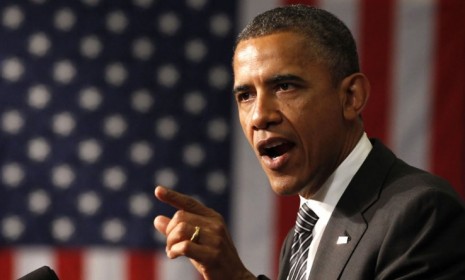Blame Europe: Obama's new economic excuse?
The president seems eager to point fingers, arguing that the euro debt crisis is one of the biggest headwinds facing the American economy

A free daily email with the biggest news stories of the day – and the best features from TheWeek.com
You are now subscribed
Your newsletter sign-up was successful
In defending his record on the economy, Obama has claimed that Europe's spreading debt crisis is frightening investors, weighing down the U.S. recovery, and stalling job creation. Many economists agree, suggesting that the future health of the U.S. economy rests on factors beyond Obama's control. But because Obama is also blaming Republicans for blocking his economic agenda, some critics say that Obama is simply grasping for scapegoats. Is Obama using Europe as an excuse?
Europe can't explain the U.S. economy's weakness: "In the Age of Obama, the buck stops in Berlin," says Bret Stephens at The Wall Street Journal. But that's ridiculous. In 1997, the Asian economic crisis collapsed currencies, zapped millions of foreign jobs, and cratered credit ratings — and the U.S. economy grew at a healthy rate of 4.5 percent. Furthermore, U.S. exports to Europe have increased over the course of the Obama presidency, meaning the continent is a net plus for the U.S. economy. Obama is quickly becoming the "Excuse-Maker-in-Chief."
The Week
Escape your echo chamber. Get the facts behind the news, plus analysis from multiple perspectives.

Sign up for The Week's Free Newsletters
From our morning news briefing to a weekly Good News Newsletter, get the best of The Week delivered directly to your inbox.
From our morning news briefing to a weekly Good News Newsletter, get the best of The Week delivered directly to your inbox.
And the U.S. should be able to adapt: Obama's excuse-making is wrongheaded, says Matthew Yglesias at Slate. "If you're driving and the road curves and there's no guardrail, what you need to do is steer the car properly, not complain about road engineering while your car goes off a cliff." The U.S. can react to the euro debt crisis in a variety of ways — such as printing more money or passing stimulus measures — that could offset its adverse effects. So "make no mistake — if disaster strikes it'll be a failure made in the United States."
"America's economic future will be determined in America, not Europe"
Hold on. The euro crisis could kill the U.S. economy: Europe's "economic carnage could easily drag our fragile economy down," says Jordan Weissmann at The Atlantic. We don't even know how exposed the U.S. financial system is to Europe, a blind spot that is "truly terrifying." While a drop in European trade wouldn't directly devastate the U.S., it could "sink world trade across the board," which in a deeply interconnected global economy is really bad news. And that's not to mention the American companies — think Ford and McDonald's — that do a a significant percentage of their business in Europe. "At this point, our future depends on the ability of Europe's leaders to get their house in order."
"Eurogeddon: A worst-case scenario handbook for the European debt crisis"
A free daily email with the biggest news stories of the day – and the best features from TheWeek.com
-
 Is Andrew’s arrest the end for the monarchy?
Is Andrew’s arrest the end for the monarchy?Today's Big Question The King has distanced the Royal Family from his disgraced brother but a ‘fit of revolutionary disgust’ could still wipe them out
-
 Quiz of The Week: 14 – 20 February
Quiz of The Week: 14 – 20 FebruaryQuiz Have you been paying attention to The Week’s news?
-
 The Week Unwrapped: Do the Freemasons have too much sway in the police force?
The Week Unwrapped: Do the Freemasons have too much sway in the police force?Podcast Plus, what does the growing popularity of prediction markets mean for the future? And why are UK film and TV workers struggling?